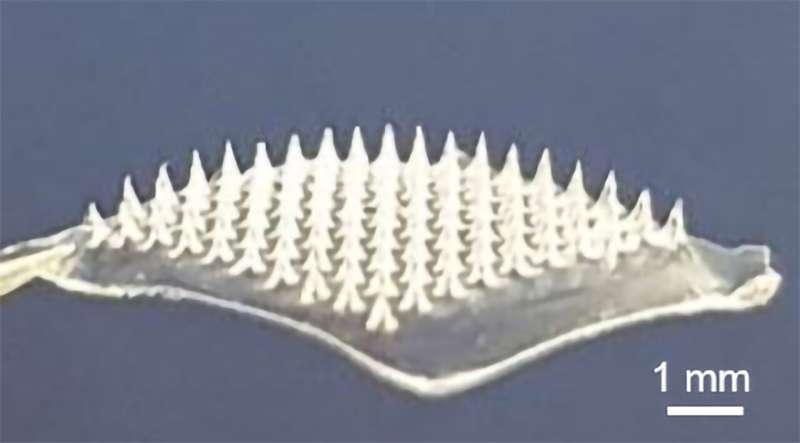Microneedle patch delivers COVID-19 DNA vaccine, doesn't require cold storage

More than 2 billion people worldwide are fully vaccinated against COVID-19. However, many who live in resource-limited countries haven't been able to get vaccines, partly because these areas lack temperature-controlled shipping and storage facilities. Now, researchers reporting in ACS Nano have developed a microneedle patch that delivers a COVID-19 DNA vaccine into the skin, causing strong immune responses in cells and mice. Importantly, the patch can be stored for over 30 days at room temperature.
To date, the U.S. Food and Drug Administration has authorized three vaccines for use during the COVID-19 pandemic: one based on protein, and two on RNA. All of them must be kept refrigerated or frozen, which limits their distribution to remote or resource-limited areas. In addition, the vaccines must be administered by a healthcare worker as an injection into a muscle. Because immune cells aren't typically found in muscles, scientists have investigated various ways to deliver vaccines into the skin, which contains abundant antigen-presenting cells (APCs) and could therefore generate a stronger immune response. Hui Li, Guangjun Nie, Hai Wang and colleagues wanted to develop a microneedle patch that efficiently delivers a COVID-19 vaccine under the skin, causing potent and durable immunity without the need for a cold chain or painful injections.
The researchers based their vaccine on DNA, which is easier to make than RNA or protein. It's also more stable than RNA. However, in clinical trials, intramuscular DNA vaccines have been limited in their effectiveness because, unlike RNA or protein, the DNA must find its way inside the cell nucleus to work. By delivering the vaccine into APC-rich skin rather than muscle, the researchers reasoned that they could increase the chances that the DNA would enter the nucleus of an APC.
To make their delivery system, the team attached DNA sequences encoding either the SARS-CoV-2 spike protein or nucleocapsid protein to the surface of non-toxic nanoparticles. Inside the nanoparticles was an adjuvant—a molecule that helps stimulate an immune response. Then, the researchers coated a microneedle patch with the vaccine nanoparticles. The small rectangular patch contained 100 biodegradable microneedles, each less than 1/10 the diameter of a bee's stinger, that could painlessly penetrate the skin's outer layer. The researchers tested the system in mice, showing that the spike-protein-encoding microneedle patch caused strong antibody and T-cell responses, with no observable side effects. Because the vaccine patches can be stored at room temperature for at least 30 days without losing efficacy, they could be an important tool for developing COVID-19 vaccines with global accessibility, the researchers say.
More information: Yue Yin et al, Separable Microneedle Patch to Protect and Deliver DNA Nanovaccines Against COVID-19, ACS Nano (2021). DOI: 10.1021/acsnano.1c03252
Journal information: ACS Nano
Provided by American Chemical Society





















